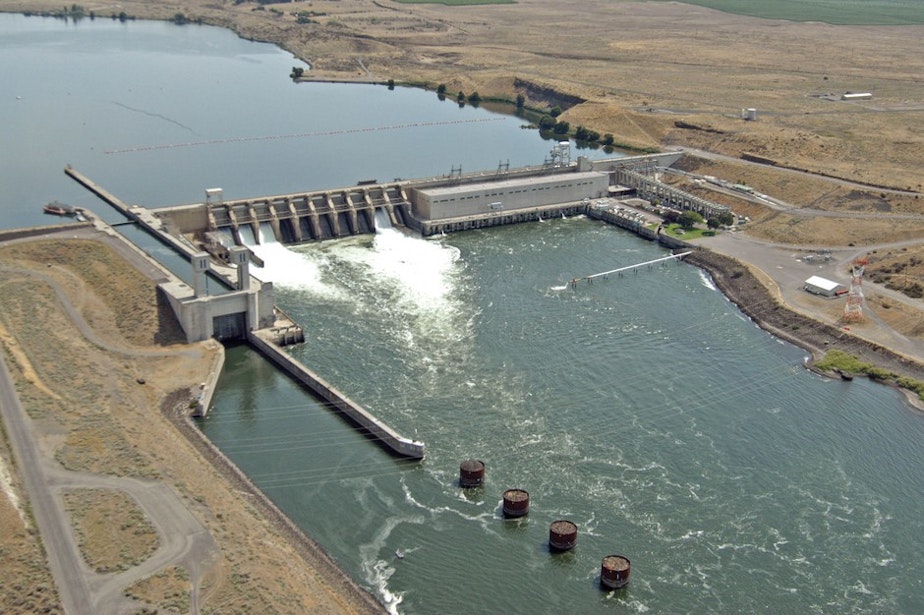Poll finds many Washington voters support removing Snake River dams

Many Washington voters support a plan to remove four dams on the Lower Snake River, according to a survey conducted for a coalition of environmental groups.
The poll found 59% of 800 Washington voters surveyed support a plan to remove the dams in an effort to protect imperiled salmon and steelhead.
The survey asked voters if they would support a plan that would remove the four controversial dams on the Lower Snake River and would invest in renewable energy, transportation improvements, and irrigation.
Of those surveyed, the poll found 59%, or around 472 people, supported such a plan. Among supporters, around 39%, or around 184 people, voiced strong support.
However, 27% of voters surveyed, or around 216 people, opposed a plan to remove dams. Of those who opposed this type of plan, 20%, or around 43 people, voiced strong opposition.
The description of the plan in the survey is similar to a proposal from U.S. Rep. Mike Simpson, R-Idaho. Simpson suggested a holistic $33.5 billion approach to dam removal. The proposal also included solutions for services that would be lost if the dams were no longer in place, such as renewable energy, grain transportation, and easily accessed irrigation.
Simpson’s plan didn’t gain enough support from the Northwest congressional delegation. Instead, Washington Gov. Jay Inslee and U.S. Sen. Patty Murray, D-Washington, proposed further discussions about the fate of the dams, including the possibility of removing or altering the dams.
Simpson’s plan helped push discussions forward, said Zachary DeWolf, spokesperson for the Washington Environmental Council.
“I’m hopeful that the poll provides continued confidence that voters across the state are adamant that they do not want salmon to go extinct and puts a little bit of pressure on all our leaders,” DeWolf said. “We certainly want everyone to step up and take some leadership on this.”
Moreover, he said, more than half of the survey respondents said they knew nothing or very little about a plan to remove the four dams on the Lower Snake before it was described to them.
“It really gives us motivation to continue to advocate for a plan for dam removal and reach new communities,” DeWolf said.
He said his group plans to continue to reach out to groups in southeastern Washington to gain support for Lower Snake River dam removal.
DeWolf said he hoped this survey would show political leaders that many Washington voters want to protect salmon.
In fact, the survey found voters were concerned about dwindling salmon runs. More than 62% of survey respondents, or 496 people, said they were concerned salmon could soon become extinct. At least 22%, or 176 people, said they were somewhat concerned about the fate of salmon. However, 12%, or 96 people, said they were not concerned that salmon would become extinct.
Salmon extinction has been a concern for Northwest tribes for many years, said DeWolf, who is affiliated with the Chippewa Cree of Rocky Boy in Montana.
“The Native nations over in southeastern Washington, and really all across the region, have been telling us their fishing and treaty rights have been an issue that they’ve been talking about for a long, long, long time,” he said.
A recent study from the Nez Perce Tribe found that around 77% of spring and summer chinook salmon runs in the Snake River Basin will be nearly extinct by 2025.
In late July, The Mellman Group, a polling firm based in D.C., contacted voters by landline, cell phone and text. The Water Foundation, a California-based environmental group, funded the poll. The poll has a 3.5% margin of error at a 95% confidence level.
Of the 800 voters surveyed, the number of people in the Seattle area and Eastern Washington was proportional to the number of people who live in those areas, said Mark Mellman, CEO of The Mellman Group, which conducted the survey.
Of voters surveyed in the Seattle area, 63% supported a plan to remove the dams. Of voters surveyed in Eastern Washington, 47% supported a plan to remove the dams.
DeWolf said the survey results showed an increasing range of support across Washington.
“This is not just an east-side of Washington issue. This is not just a west-side of Washington issue,” DeWolf said. “This issue does feel like something that unites us, that seems to be a widespread feeling across the state.” [Copyright 2021 Northwest News Network]
